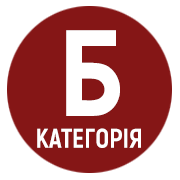SIMULATION OF THE PROCESS OF PROFESSIONAL DEVELOPMENT OF THE FUTURE TEACHER OF LABOR EDUCATION AND TECHNOLOGY BY MEANS OF INDEPENDENT WORK
Keywords:
model, modeling, professional development, future teachers of labor training and technologies.Abstract
In the article reveals the content of the structural and functional model of professional development of future teachers of labor training and technology. To visualize the specific goals, ways and results of professional development of future teachers of labor training and technology in the process of independent work, a modeling method was used, which is based on the principle of analogy and provides the opportunity to study a real object not directly but through consideration an object similar to it, that is, its model. The method of experimental research «pedagogical modeling» is revealed as the initial stage of process design, which involves creating conditions to achieve the goal, determining the stages and components of this process, developing strategies, forms, methods, tools, technologies of professional development and more. The structural-functional model is based primarily on the social order based on the expected results of the future teacher of labor training and technology for continuous professional development by means of independent work throughout life. Given the specifics of the process of professional development of future teachers of labor education and technology in the process of independent work, in our opinion, we must take into account the model of future professional activity, the structural elements of which we include taking into account the social order theoretical and methodological block (purpose, conceptual principles, methodological approaches, principles); procedural-semantic block (structural components, strategies, forms, methods, means) with an interactive development program and diagnostic-effective block (criteria, indicators, levels), focused on the preparation of future teachers of labor training and technology for continuous professional development by means of independent work during life. Also, in the article defines and theoretically substantiates the pedagogical conditions for ensuring the success and efficiency of the studied phenomenon, which ensured the continuity, efficiency and reliability of the process.
References
Бабанский Ю. К. Проблемы повышения эффективности педагогических исследований : дидактический аспект. Москва : Педагогика. 1982. 192 с.
Гончаренко С. У. Педагогічні дослідження : методологічні поради молодим науковцям. Київ – Вінниця : ДОВ «Вінниця». 2008. 278 с.
Гончаренко С. У. Український педагогічний словник. К. : Либідь. 1997. 376 с.
Корець М. С. Теорія і практика технічної підготовки вчителів трудового навчання: автореф. дис. ... д-ра пед. наук : 13.00.04. Нац. пед. ун-т ім. М. П. Драгоманова. Київ. 2007. 38 с.
Матвієнко О. В. Теоретико-методичні засади підготовки майбутніх учителів до педагогічної взаємодії у навчально-виховному середовищі школи першого ступеня : дис. … доктора пед. наук : 13.00.04. Нац. пед. ун-т імені М. П. Драгоманова. Київ. 2010. 496 с. 6. Моделирование деятельности специалиста на основе исследования. [под. ред Е. Смирновой]. Ленинград : Ленинградский госуниверситет. 1984. 177 с.
Національна стратегія розвитку освіти в Україні на 2012–2021 роки. База даних [Законодавство України]. URL : http://zakon2.rada.gov.ua/laws/show/344/2013. (дата звернення: 11.10.2019).
Оршанський Л. Професійний розвиток і формування професійного іміджу майбутнього вчителя технологій у навчально-професійній діяльності. Психолого-педагогічні проблеми сільської школи. Випуск 52. 2015. С. 68-73. URL : https://library.udpu.edu.ua/library_files/psuh_pedagog_probl_silsk_shkolu/5 2/11.pdf (дата звернення: 16.08.2019).
Приходько Ю. О., Юрченко В. І. Психологічний словник-довідник. К. : Каравела. 2012. 157 с.
Сучасний словник іншомовних слів : близько 20 тисяч слів і словосполучень. НАН України, Ін-т мовознавства ім. О. О. Потебні; уклад. О. І. Скопненко, Т. В. Цимбалюк. Київ : Довіра. 2006. 789 с.
Філософський енциклопедичний словник. Нац. акад. наук України, Ін-т філософії ім. Г. С. Сковороди. [ред. кол. : Шинкарук В. І. та ін.]. Київ : Абрис. 2002. 742 с.
Хуторской А. Деятельность как содержание образования. Народное образование. 2003. № 8. С. 107–114.
Шевченко Л. С. Теоретичні і методичні засади підготовки майбутніх учителів технологій до інноваційної педагогічної діяльності : дис. … д-ра пед.. наук : 015 – професійна освіта (за спеціалізаціями) спеціалізація : 13.00.04 – теорія і методика професійної освіти. 01 Освіта. Вінницький державний педагогічний університет імені Михайла Коцюбинського. Вінниця. 2019. 568 с.
Markocki Z. Nauczyciel – wychowawca wobec nowej rzeczywistości edukacyjnej społeczeństwa. KU Dobrej Szkole. Nauczyciele. Technologie kształcenia. Redakcja naukowa Czesław Prewka. Tom II. Wyżsa Szkoła Humanistyczna TWP w Szczecinie, Instytut Technologii Eksploatacji. PIB. Radom. 2009. S. 15-21.







